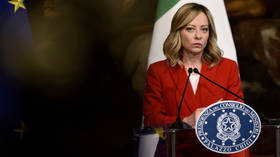Italy’s Meloni slams ‘surreal’ backroom deals for EU jobs

Italian Prime Minister Giorgia Meloni has hit out at backroom deals being struck to fill top positions in the EU’s institutions, saying it was “surreal” that voters’ opinions were being ignored.
Citizens across the bloc shifted significantly away from the left in the European Parliament elections earlier this month, with ruling coalitions in Germany and France being comprehensively trounced by right-wing parties.
However, the three main political groups in the parliament, which are largely centrist, reportedly agreed a deal to fill the top EU posts on Tuesday. The arrangement would see Germany’s Ursula von der Leyen returned as president of the European Commission for a second term.
Addressing the Italian parliament on Wednesday, Meloni said it was “surreal” that names for top EU positions had been presented “without even pretending to discuss the signals from voters.” Under the reported deal, Estonian Prime Minister Kaja Kallas will become the new EU foreign policy chief, replacing Spain’s Josep Borrell; while former Portuguese Prime Minister Antonio Costa will preside over the European Council, which was previously chaired by Belgium’s Charles Michel.
The names will be presented at an EU leaders meeting in Brussels on Thursday for their approval.
Media reports suggested that Italy had effectively been excluded from discussions regarding the agreement, which was approved by the leaders of France, Germany, Spain, Poland, Greece, and the Netherlands.
The Italian prime minister claimed that this kind of backroom deal contradicted the original spirit of the European Union, by which institutions “were conceived as neutral entities, thus able to guarantee all member states, regardless of the political color of the governments of those member states.”
Meloni, whose European Conservatives and Reformists (ECR) group won the most votes in Italy and is currently the third-biggest in the European Parliament, said she wanted the shift to the right to be reflected in the bloc’s decision-making.
“The third [largest] group today is a group that is not liked by those who are deciding,” she said, calling the EU an “invasive bureaucratic giant.”
Meanwhile, the appointment of von der Leyen will still need to be approved by the European Parliament and, according to media, she might seek to win Meloni’s support by giving Italy a senior portfolio in the next European Commission.













